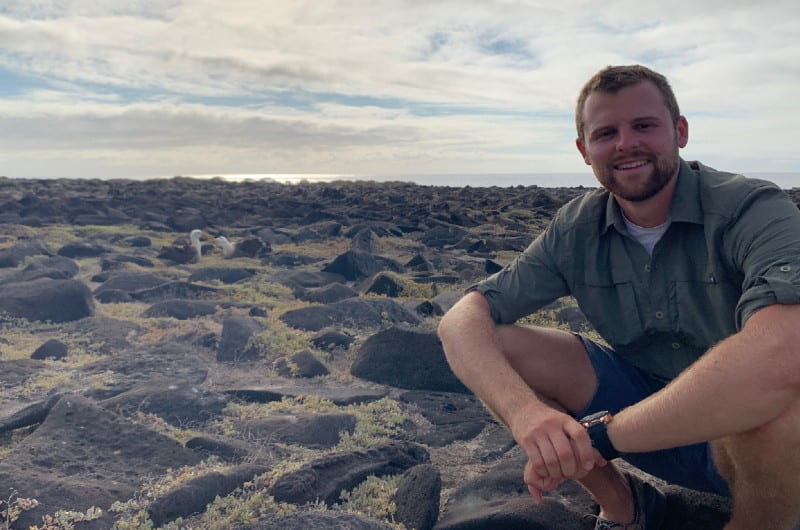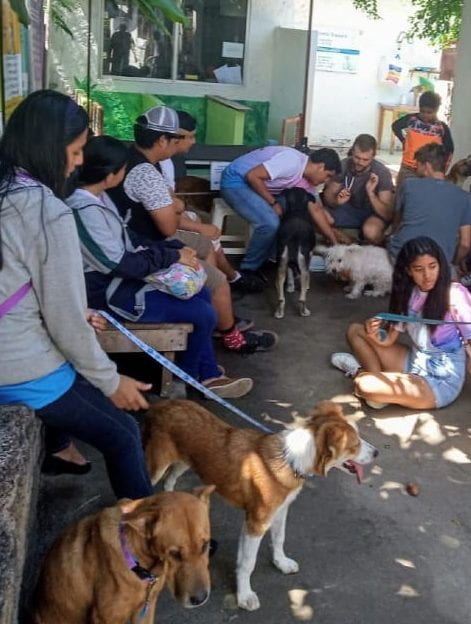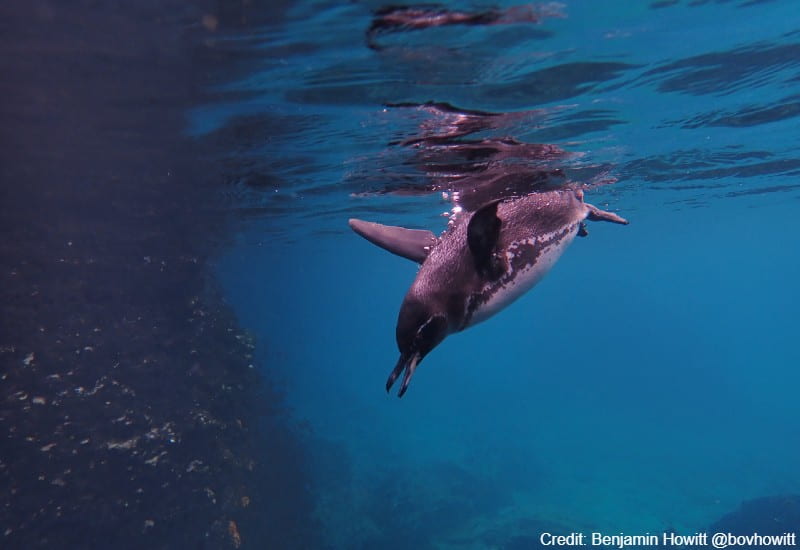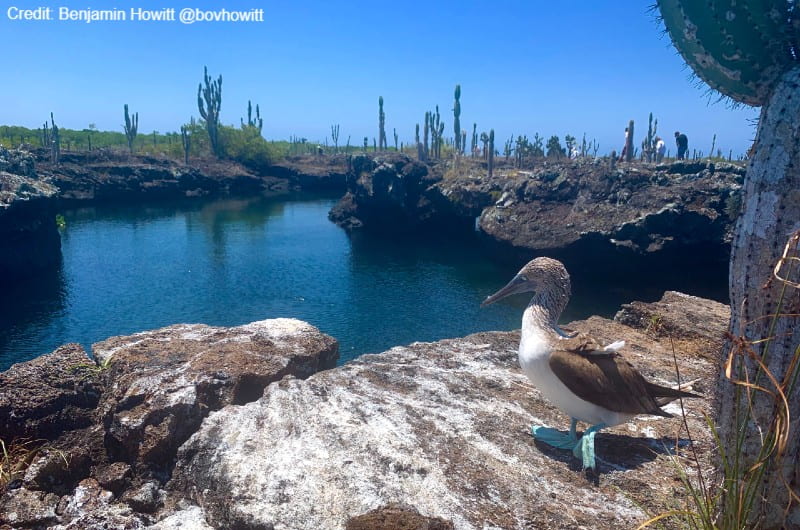 After working in a veterinary practice in Guernsey for a number of years, Bristol alum Ben Howitt went for the ultimate change of scenery by moving to the Galapagos. There he worked for almost a year as Chief Veterinary Officer for a charitable association, spending his free time scuba-diving and learning more about the beautiful animals which inhabit the islands.
After working in a veterinary practice in Guernsey for a number of years, Bristol alum Ben Howitt went for the ultimate change of scenery by moving to the Galapagos. There he worked for almost a year as Chief Veterinary Officer for a charitable association, spending his free time scuba-diving and learning more about the beautiful animals which inhabit the islands.
He’s since launched his own foundation, Pan Animalia, which aims to provide accessible healthcare for domestic animals in the Galapagos and help manage their population numbers. This plays a crucial role in protecting the biodiversity of the islands. We caught up with him to hear more about his work and vision for his foundation.
What’s your fondest memory of your time at Bristol?
I was educated in Singapore for the entirety of my schooling, so when I came to Bristol in 2011 to study Veterinary Medicine, I had very little knowledge of the city or the University. Nonetheless, throughout my course I made plenty of very happy memories – almost too many to recall. What I remain fond of to this day is the atmosphere of the city as a whole, across all seasons, particularly at the Clifton Suspension Bridge and on the Downs. I also enjoyed events such as the Bristol Balloon Festival, which make the city so unique.
How did studying at the University impact you as a person?
The university experience doesn’t just revolve around academics, it’s also about developing social skills, joining sports teams and opportunities that help pupils build balance. I felt that the University helped me to develop the right drive in my career, but also taught me how to switch that focus off and fill my free time with activities I enjoy. Balance is an important part of life, and university is our first introduction to understanding and appreciating that.

Can you tell me a bit more about the career journey you embarked on after graduation?
After I graduated in 2016, I moved to the island of Guernsey in the English Channel to join a mixed-discipline veterinary practice. With a team of eight to ten vets and nearly 30 more support staff, it was a fantastic introduction to my career as a veterinary surgeon. I developed skills across all disciplines: farm animals, horses, small animals, and even exotic species. I also took on work at the Guernsey Society for the Prevention of Cruelty to Animals (GSPCA), which allowed me to have greater exposure to wildlife including marine birds and birds of prey.
I spent two and a half years on the islands before deciding to make a change and explore more opportunities within my chosen career. This led me to take up a role as Chief Veterinary Officer for a charitable clinic called Darwin Animal Doctors on the Galapagos Islands – which was quite a change of pace! The local population speak Spanish, so I had to consult almost exclusively in another language whilst managing an everchanging group of volunteers. It was incredibly eye-opening and you can hear more about that experience on the podcast ‘A Little Life’, hosted by Aniket Rajgarhia.
After eight months, I left the island, as the charitable practice decided to close its doors permanently. I then decided to team up with members of the local community and restart the project with their support, setting up my own UK charitable foundation, Pan Animalia, which will soon be launching the new Galapagos Animal Doctors programme.
What inspired you to set up Pan Animalia and what are the main aims of the foundation?
I was inspired to set up the foundation after seeing the need for accessible veterinary healthcare for domestic animals, such as dogs and cats, on the islands. Alongside caring for these animals, one of our main goals is to address the growing conflict between domestic animals and endemic wildlife. Dogs and cats are classed as invasive species, and management of their population is critical to protecting the biodiversity and unique habitat of the Galapagos ecosystem. As we see in areas all over the world, an unmanaged population growth can result in competition for resources, predation, habitat encroachment, and also infectious disease transmission to endemic wildlife.
The Galapagos is one of the most unique environments in the modern world, boasting a huge array of dynamic ecosystems. We aim to help and support government bodies and local projects in tackling the potential risks of unmanaged population growth through sterilisation programmes for cats and dogs on the island.
We’re also looking to develop educational programmes and community engagement projects in collaboration with groups and organisations on the islands, as well as supporting local government bodies to manage domestic animal health.
How has the coronavirus pandemic impacted the work of your foundation?
Launching a new charitable project in the midst of a global pandemic hasn’t been ideal! One of the biggest challenges has been trying to secure funding through different sources. Many potential funders are understandably having to hold off and grant systems are being delayed, so we’ve had to be a bit more creative in our approach. In the meantime, we’re aiming to build a solid following through our newsletters and a series of public and virtual talks. We are a passionate group of young professionals and getting the message out to the global community about the risks to the Galapagos is currently our big focus.

During your time in the Galapagos, what did an average working day look like for you?
We would open up our clinic doors at about 7am and admit any patients that were to be operated on that morning, keeping our gates open for any walk-in consultations. The gates would be closed at 11.30am and re-opened in the afternoon at 3pm, to account for the extremely hot middle period of the day. Our day would end at about 7pm. We would deal with numerous conditions but in particular we saw cases of tick fever, which can cause dogs to require blood transfusions, Parvovirus, which affects young puppies, and Distemper, a respiratory and neurological virus not seen in the UK due to our vaccination protocols.
What’s the most beautiful or interesting animal you spotted during your time on the islands and can you describe the moment that you saw it?
I have always loved the sea and the opportunities to scuba dive in the Galapagos were too good to be true. I would dive whenever I got the opportunity and spotted many amazing creatures. I started taking photos of some of the incredible animals I saw, including sealions, penguins and manta rays. The Galapagos is well known for its reptiles and birds, but it has just as much biodiversity beneath the surface of the sea that’s worth exploring.

What’s been the proudest moment of your career to date?
The proudest moment of my career thus far is having my own charitable foundation that I can now drive forward with a great supportive team behind me. There have been many proud moments in my career but once you enter project development and charitable work, it feels like there’s always a higher peak to climb – which is an attitude that has both its costs and benefits!
To keep up to date with developments on Pan Animalia you can sign up to their newsletter via their website.
